Utilitarian Ethics: Analysis of Healthcare Funding Proposal
VerifiedAdded on 2021/04/24
|5
|1187
|71
Essay
AI Summary
This essay critically analyzes a proposal by the Counties Manunaku District Health Board in New Zealand to accept funding from Ronald McDonald House Charities for accommodation and other services at Middlemore Hospital, using a utilitarian ethical framework. The essay acknowledges the potential benefits, such as improved healthcare services for a large number of people, especially considering the district's economic constraints. However, it also raises ethical concerns regarding the long-term consequences of linking a healthcare institution with a fast-food company, particularly in a country facing obesity and related health issues. The essay explores both Act and Rule Utilitarianism, ultimately concluding that while the proposal aligns with utilitarian values by maximizing overall happiness and health services, it presents potential ethical challenges due to its association with McDonald's and its impact on public health. The essay references several sources to support its arguments, including studies on obesity, diabetes, and the impact of charitable funding on healthcare.
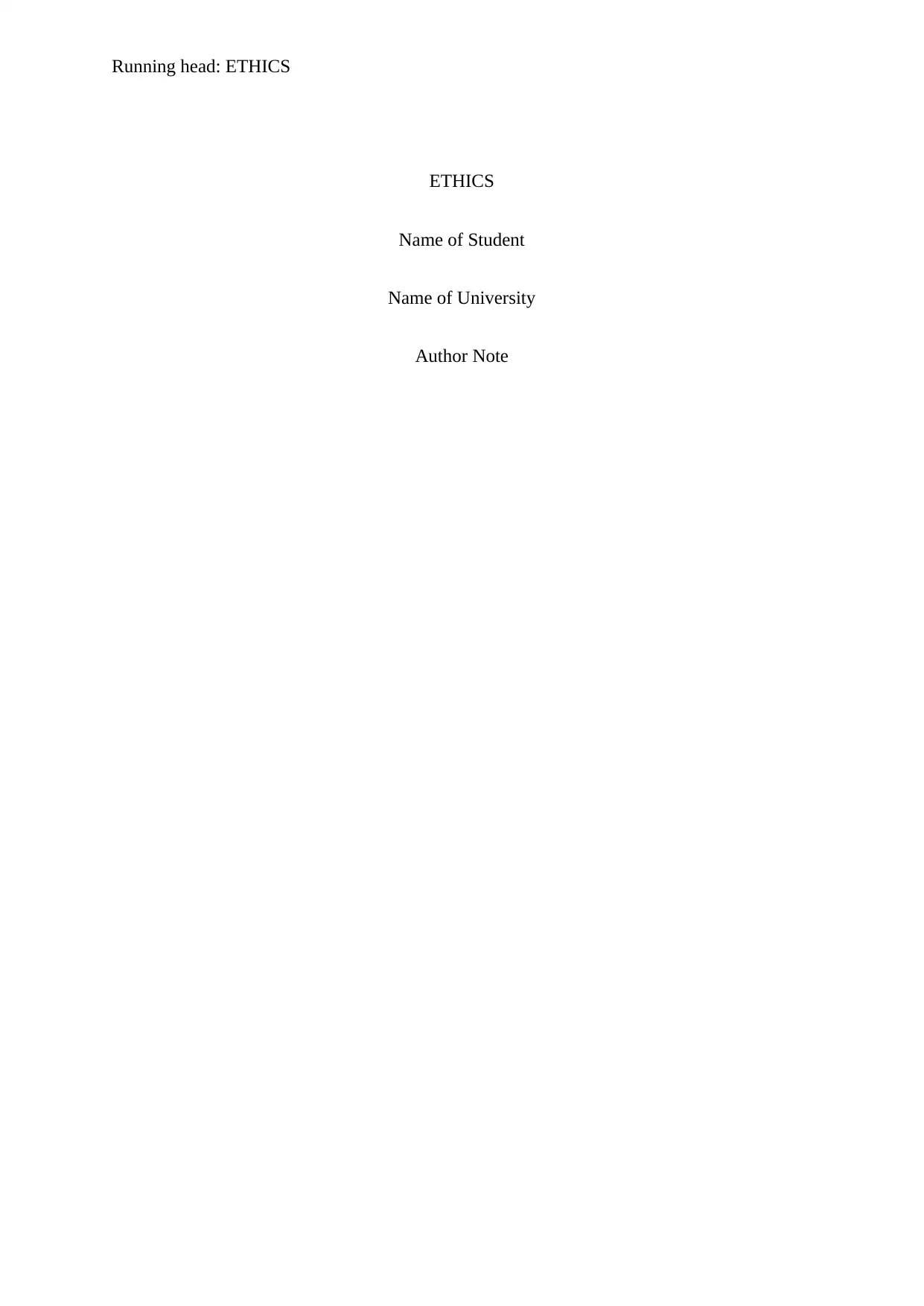
Running head: ETHICS
ETHICS
Name of Student
Name of University
Author Note
ETHICS
Name of Student
Name of University
Author Note
Paraphrase This Document
Need a fresh take? Get an instant paraphrase of this document with our AI Paraphraser
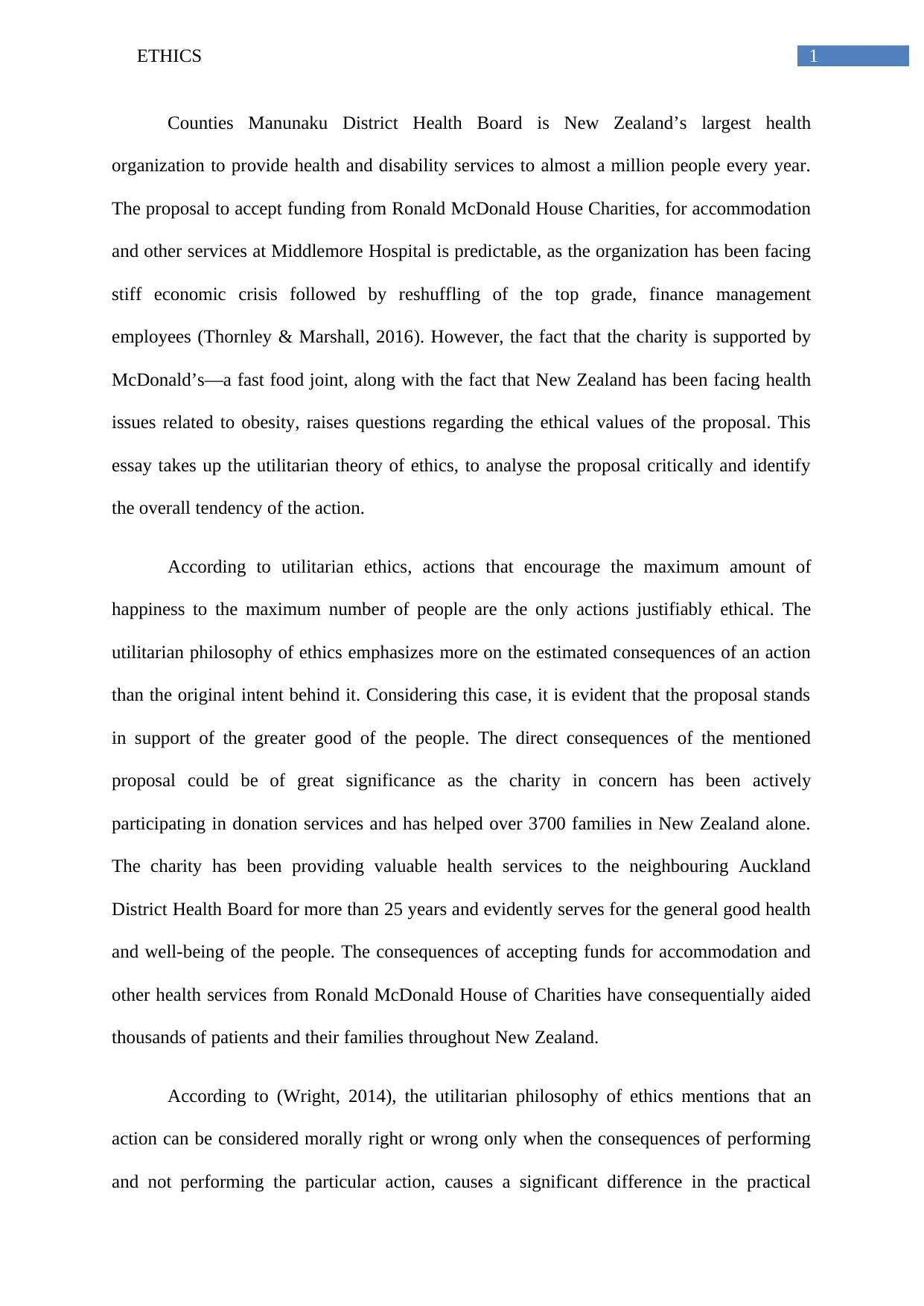
1ETHICS
Counties Manunaku District Health Board is New Zealand’s largest health
organization to provide health and disability services to almost a million people every year.
The proposal to accept funding from Ronald McDonald House Charities, for accommodation
and other services at Middlemore Hospital is predictable, as the organization has been facing
stiff economic crisis followed by reshuffling of the top grade, finance management
employees (Thornley & Marshall, 2016). However, the fact that the charity is supported by
McDonald’s—a fast food joint, along with the fact that New Zealand has been facing health
issues related to obesity, raises questions regarding the ethical values of the proposal. This
essay takes up the utilitarian theory of ethics, to analyse the proposal critically and identify
the overall tendency of the action.
According to utilitarian ethics, actions that encourage the maximum amount of
happiness to the maximum number of people are the only actions justifiably ethical. The
utilitarian philosophy of ethics emphasizes more on the estimated consequences of an action
than the original intent behind it. Considering this case, it is evident that the proposal stands
in support of the greater good of the people. The direct consequences of the mentioned
proposal could be of great significance as the charity in concern has been actively
participating in donation services and has helped over 3700 families in New Zealand alone.
The charity has been providing valuable health services to the neighbouring Auckland
District Health Board for more than 25 years and evidently serves for the general good health
and well-being of the people. The consequences of accepting funds for accommodation and
other health services from Ronald McDonald House of Charities have consequentially aided
thousands of patients and their families throughout New Zealand.
According to (Wright, 2014), the utilitarian philosophy of ethics mentions that an
action can be considered morally right or wrong only when the consequences of performing
and not performing the particular action, causes a significant difference in the practical
Counties Manunaku District Health Board is New Zealand’s largest health
organization to provide health and disability services to almost a million people every year.
The proposal to accept funding from Ronald McDonald House Charities, for accommodation
and other services at Middlemore Hospital is predictable, as the organization has been facing
stiff economic crisis followed by reshuffling of the top grade, finance management
employees (Thornley & Marshall, 2016). However, the fact that the charity is supported by
McDonald’s—a fast food joint, along with the fact that New Zealand has been facing health
issues related to obesity, raises questions regarding the ethical values of the proposal. This
essay takes up the utilitarian theory of ethics, to analyse the proposal critically and identify
the overall tendency of the action.
According to utilitarian ethics, actions that encourage the maximum amount of
happiness to the maximum number of people are the only actions justifiably ethical. The
utilitarian philosophy of ethics emphasizes more on the estimated consequences of an action
than the original intent behind it. Considering this case, it is evident that the proposal stands
in support of the greater good of the people. The direct consequences of the mentioned
proposal could be of great significance as the charity in concern has been actively
participating in donation services and has helped over 3700 families in New Zealand alone.
The charity has been providing valuable health services to the neighbouring Auckland
District Health Board for more than 25 years and evidently serves for the general good health
and well-being of the people. The consequences of accepting funds for accommodation and
other health services from Ronald McDonald House of Charities have consequentially aided
thousands of patients and their families throughout New Zealand.
According to (Wright, 2014), the utilitarian philosophy of ethics mentions that an
action can be considered morally right or wrong only when the consequences of performing
and not performing the particular action, causes a significant difference in the practical
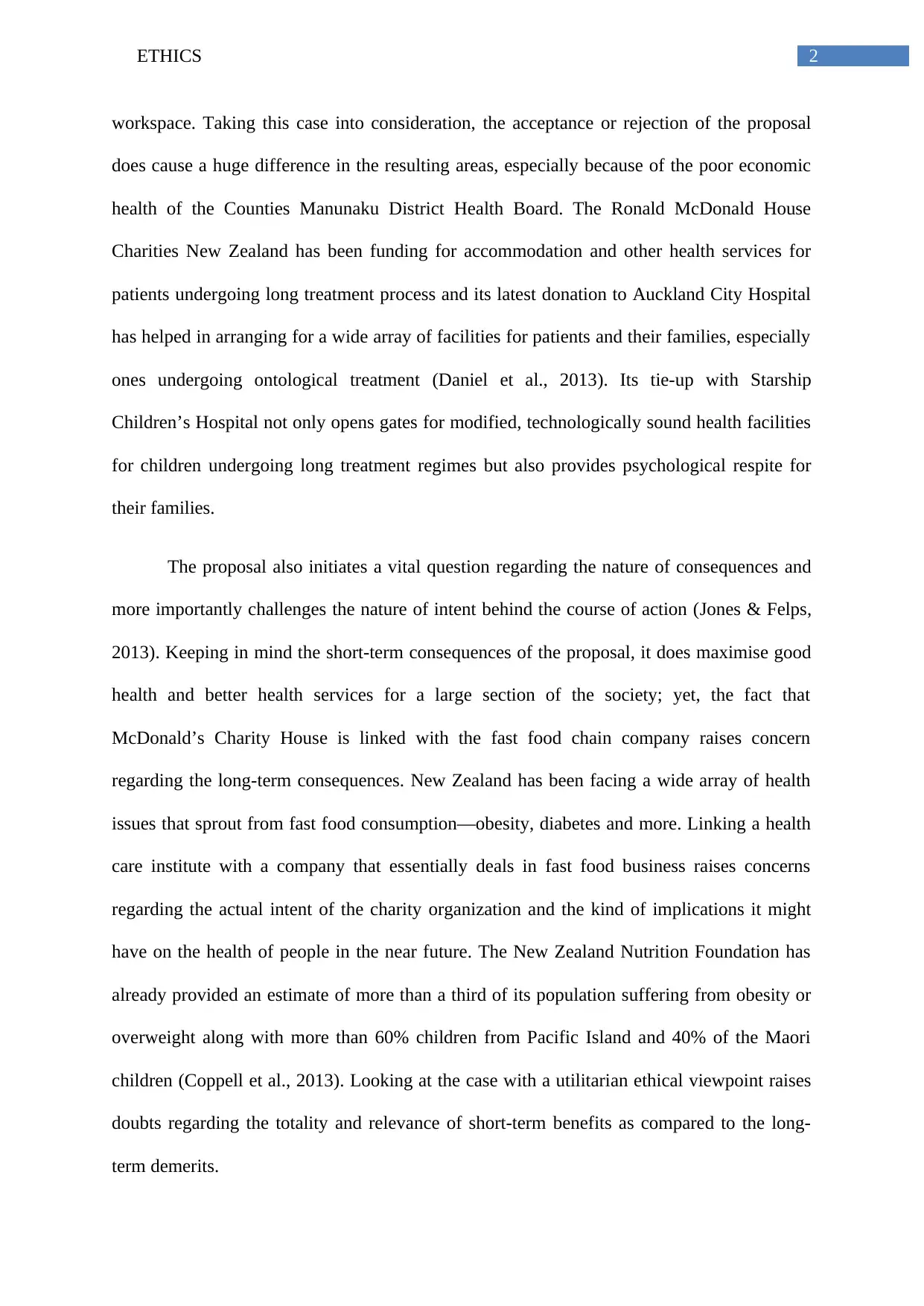
2ETHICS
workspace. Taking this case into consideration, the acceptance or rejection of the proposal
does cause a huge difference in the resulting areas, especially because of the poor economic
health of the Counties Manunaku District Health Board. The Ronald McDonald House
Charities New Zealand has been funding for accommodation and other health services for
patients undergoing long treatment process and its latest donation to Auckland City Hospital
has helped in arranging for a wide array of facilities for patients and their families, especially
ones undergoing ontological treatment (Daniel et al., 2013). Its tie-up with Starship
Children’s Hospital not only opens gates for modified, technologically sound health facilities
for children undergoing long treatment regimes but also provides psychological respite for
their families.
The proposal also initiates a vital question regarding the nature of consequences and
more importantly challenges the nature of intent behind the course of action (Jones & Felps,
2013). Keeping in mind the short-term consequences of the proposal, it does maximise good
health and better health services for a large section of the society; yet, the fact that
McDonald’s Charity House is linked with the fast food chain company raises concern
regarding the long-term consequences. New Zealand has been facing a wide array of health
issues that sprout from fast food consumption—obesity, diabetes and more. Linking a health
care institute with a company that essentially deals in fast food business raises concerns
regarding the actual intent of the charity organization and the kind of implications it might
have on the health of people in the near future. The New Zealand Nutrition Foundation has
already provided an estimate of more than a third of its population suffering from obesity or
overweight along with more than 60% children from Pacific Island and 40% of the Maori
children (Coppell et al., 2013). Looking at the case with a utilitarian ethical viewpoint raises
doubts regarding the totality and relevance of short-term benefits as compared to the long-
term demerits.
workspace. Taking this case into consideration, the acceptance or rejection of the proposal
does cause a huge difference in the resulting areas, especially because of the poor economic
health of the Counties Manunaku District Health Board. The Ronald McDonald House
Charities New Zealand has been funding for accommodation and other health services for
patients undergoing long treatment process and its latest donation to Auckland City Hospital
has helped in arranging for a wide array of facilities for patients and their families, especially
ones undergoing ontological treatment (Daniel et al., 2013). Its tie-up with Starship
Children’s Hospital not only opens gates for modified, technologically sound health facilities
for children undergoing long treatment regimes but also provides psychological respite for
their families.
The proposal also initiates a vital question regarding the nature of consequences and
more importantly challenges the nature of intent behind the course of action (Jones & Felps,
2013). Keeping in mind the short-term consequences of the proposal, it does maximise good
health and better health services for a large section of the society; yet, the fact that
McDonald’s Charity House is linked with the fast food chain company raises concern
regarding the long-term consequences. New Zealand has been facing a wide array of health
issues that sprout from fast food consumption—obesity, diabetes and more. Linking a health
care institute with a company that essentially deals in fast food business raises concerns
regarding the actual intent of the charity organization and the kind of implications it might
have on the health of people in the near future. The New Zealand Nutrition Foundation has
already provided an estimate of more than a third of its population suffering from obesity or
overweight along with more than 60% children from Pacific Island and 40% of the Maori
children (Coppell et al., 2013). Looking at the case with a utilitarian ethical viewpoint raises
doubts regarding the totality and relevance of short-term benefits as compared to the long-
term demerits.
⊘ This is a preview!⊘
Do you want full access?
Subscribe today to unlock all pages.

Trusted by 1+ million students worldwide
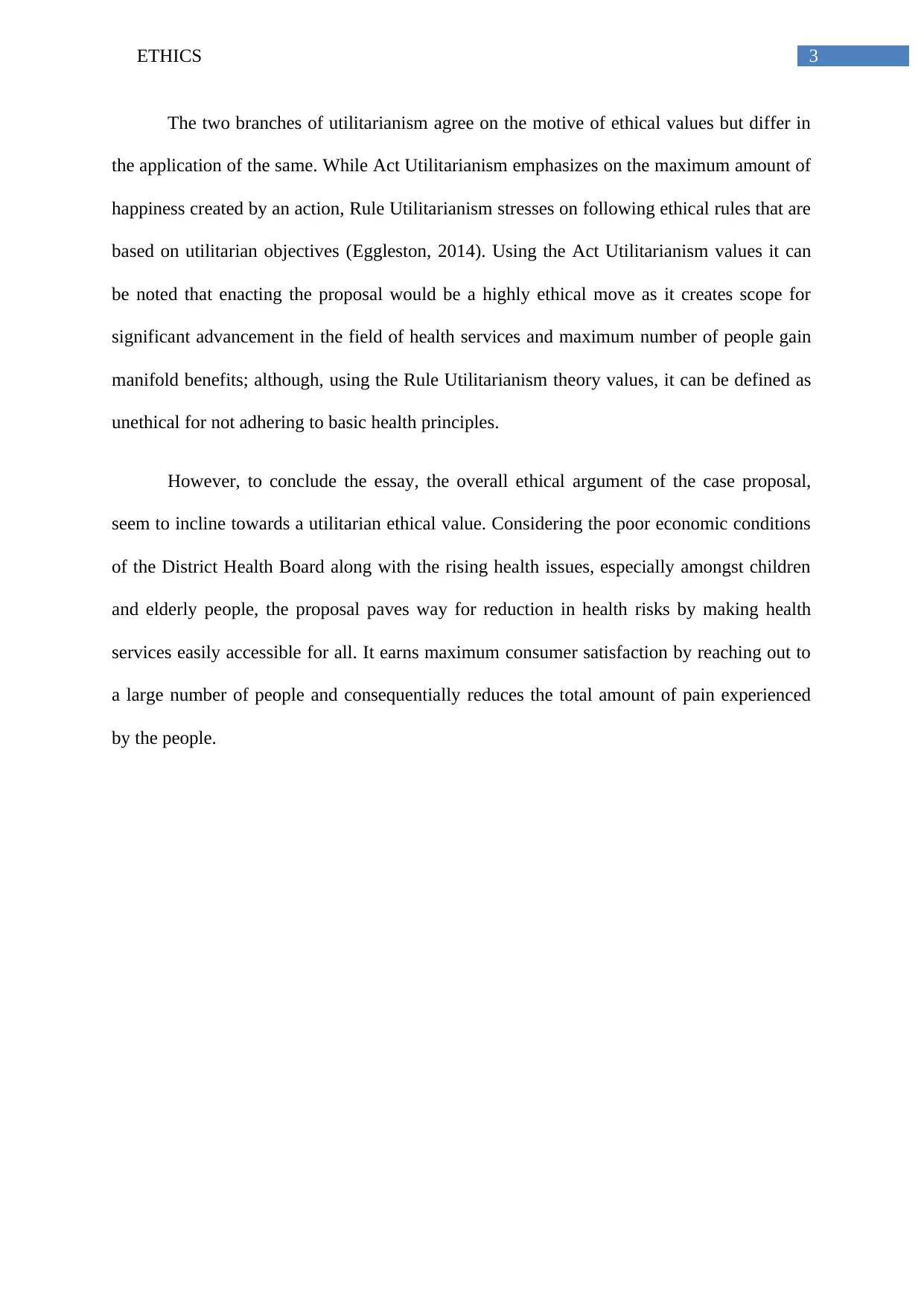
3ETHICS
The two branches of utilitarianism agree on the motive of ethical values but differ in
the application of the same. While Act Utilitarianism emphasizes on the maximum amount of
happiness created by an action, Rule Utilitarianism stresses on following ethical rules that are
based on utilitarian objectives (Eggleston, 2014). Using the Act Utilitarianism values it can
be noted that enacting the proposal would be a highly ethical move as it creates scope for
significant advancement in the field of health services and maximum number of people gain
manifold benefits; although, using the Rule Utilitarianism theory values, it can be defined as
unethical for not adhering to basic health principles.
However, to conclude the essay, the overall ethical argument of the case proposal,
seem to incline towards a utilitarian ethical value. Considering the poor economic conditions
of the District Health Board along with the rising health issues, especially amongst children
and elderly people, the proposal paves way for reduction in health risks by making health
services easily accessible for all. It earns maximum consumer satisfaction by reaching out to
a large number of people and consequentially reduces the total amount of pain experienced
by the people.
The two branches of utilitarianism agree on the motive of ethical values but differ in
the application of the same. While Act Utilitarianism emphasizes on the maximum amount of
happiness created by an action, Rule Utilitarianism stresses on following ethical rules that are
based on utilitarian objectives (Eggleston, 2014). Using the Act Utilitarianism values it can
be noted that enacting the proposal would be a highly ethical move as it creates scope for
significant advancement in the field of health services and maximum number of people gain
manifold benefits; although, using the Rule Utilitarianism theory values, it can be defined as
unethical for not adhering to basic health principles.
However, to conclude the essay, the overall ethical argument of the case proposal,
seem to incline towards a utilitarian ethical value. Considering the poor economic conditions
of the District Health Board along with the rising health issues, especially amongst children
and elderly people, the proposal paves way for reduction in health risks by making health
services easily accessible for all. It earns maximum consumer satisfaction by reaching out to
a large number of people and consequentially reduces the total amount of pain experienced
by the people.
Paraphrase This Document
Need a fresh take? Get an instant paraphrase of this document with our AI Paraphraser
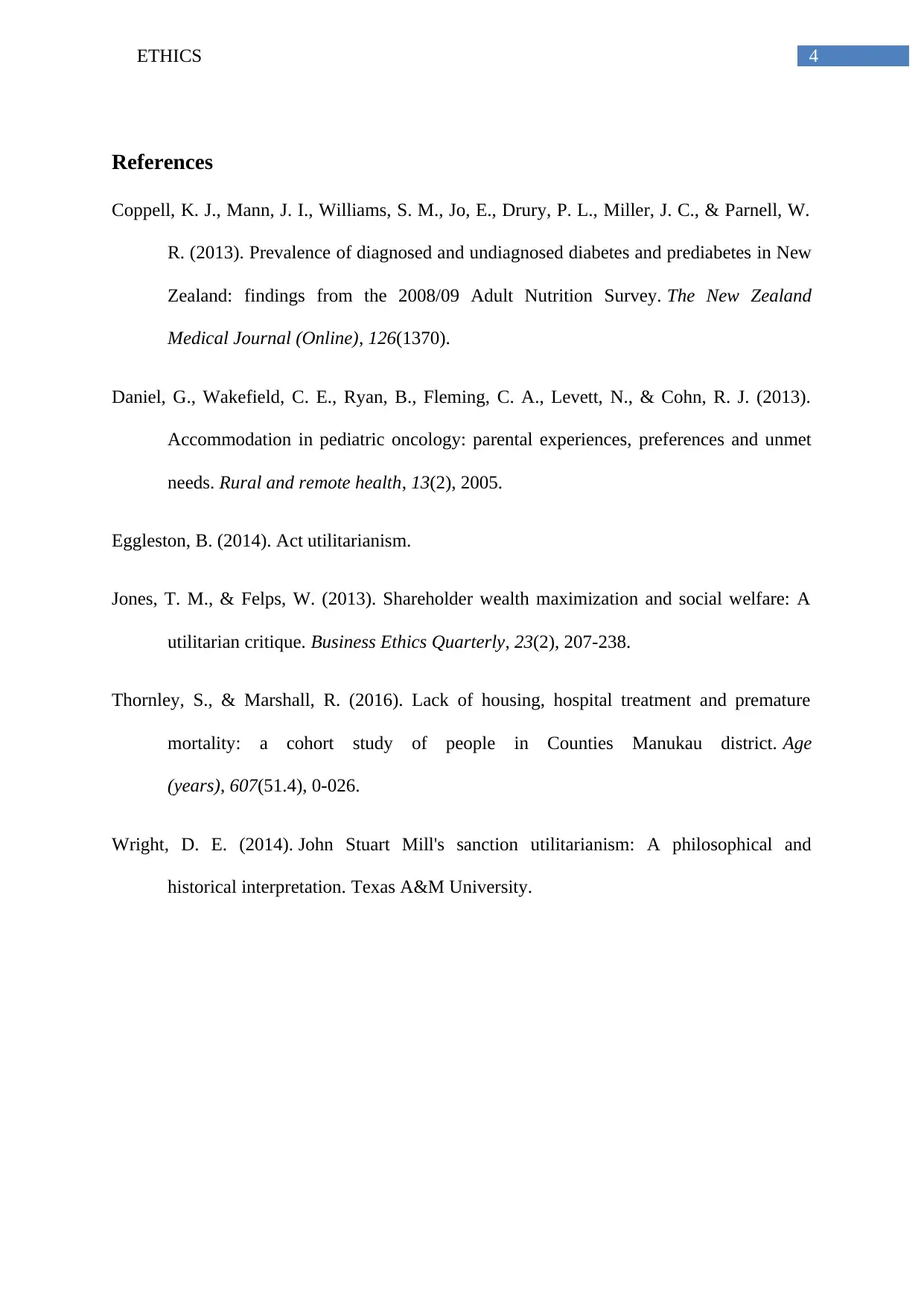
4ETHICS
References
Coppell, K. J., Mann, J. I., Williams, S. M., Jo, E., Drury, P. L., Miller, J. C., & Parnell, W.
R. (2013). Prevalence of diagnosed and undiagnosed diabetes and prediabetes in New
Zealand: findings from the 2008/09 Adult Nutrition Survey. The New Zealand
Medical Journal (Online), 126(1370).
Daniel, G., Wakefield, C. E., Ryan, B., Fleming, C. A., Levett, N., & Cohn, R. J. (2013).
Accommodation in pediatric oncology: parental experiences, preferences and unmet
needs. Rural and remote health, 13(2), 2005.
Eggleston, B. (2014). Act utilitarianism.
Jones, T. M., & Felps, W. (2013). Shareholder wealth maximization and social welfare: A
utilitarian critique. Business Ethics Quarterly, 23(2), 207-238.
Thornley, S., & Marshall, R. (2016). Lack of housing, hospital treatment and premature
mortality: a cohort study of people in Counties Manukau district. Age
(years), 607(51.4), 0-026.
Wright, D. E. (2014). John Stuart Mill's sanction utilitarianism: A philosophical and
historical interpretation. Texas A&M University.
References
Coppell, K. J., Mann, J. I., Williams, S. M., Jo, E., Drury, P. L., Miller, J. C., & Parnell, W.
R. (2013). Prevalence of diagnosed and undiagnosed diabetes and prediabetes in New
Zealand: findings from the 2008/09 Adult Nutrition Survey. The New Zealand
Medical Journal (Online), 126(1370).
Daniel, G., Wakefield, C. E., Ryan, B., Fleming, C. A., Levett, N., & Cohn, R. J. (2013).
Accommodation in pediatric oncology: parental experiences, preferences and unmet
needs. Rural and remote health, 13(2), 2005.
Eggleston, B. (2014). Act utilitarianism.
Jones, T. M., & Felps, W. (2013). Shareholder wealth maximization and social welfare: A
utilitarian critique. Business Ethics Quarterly, 23(2), 207-238.
Thornley, S., & Marshall, R. (2016). Lack of housing, hospital treatment and premature
mortality: a cohort study of people in Counties Manukau district. Age
(years), 607(51.4), 0-026.
Wright, D. E. (2014). John Stuart Mill's sanction utilitarianism: A philosophical and
historical interpretation. Texas A&M University.
1 out of 5
Your All-in-One AI-Powered Toolkit for Academic Success.
+13062052269
info@desklib.com
Available 24*7 on WhatsApp / Email
![[object Object]](/_next/static/media/star-bottom.7253800d.svg)
Unlock your academic potential
Copyright © 2020–2026 A2Z Services. All Rights Reserved. Developed and managed by ZUCOL.
